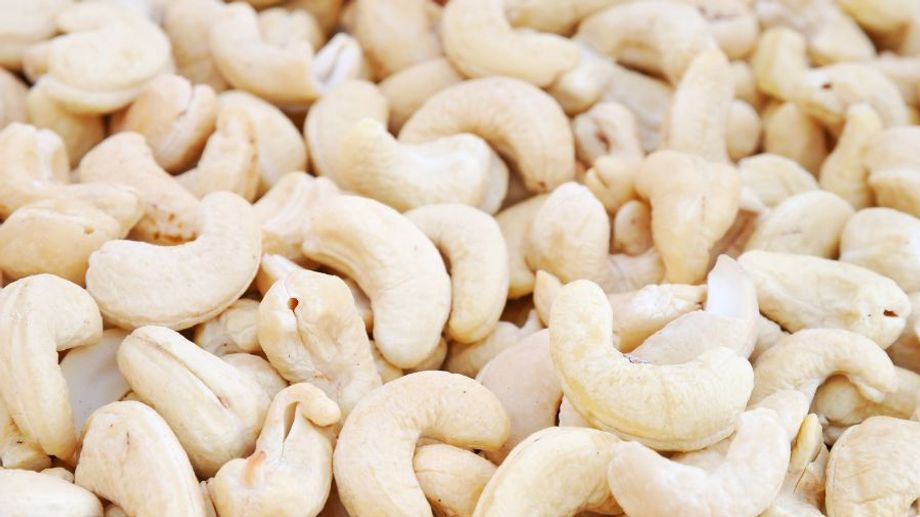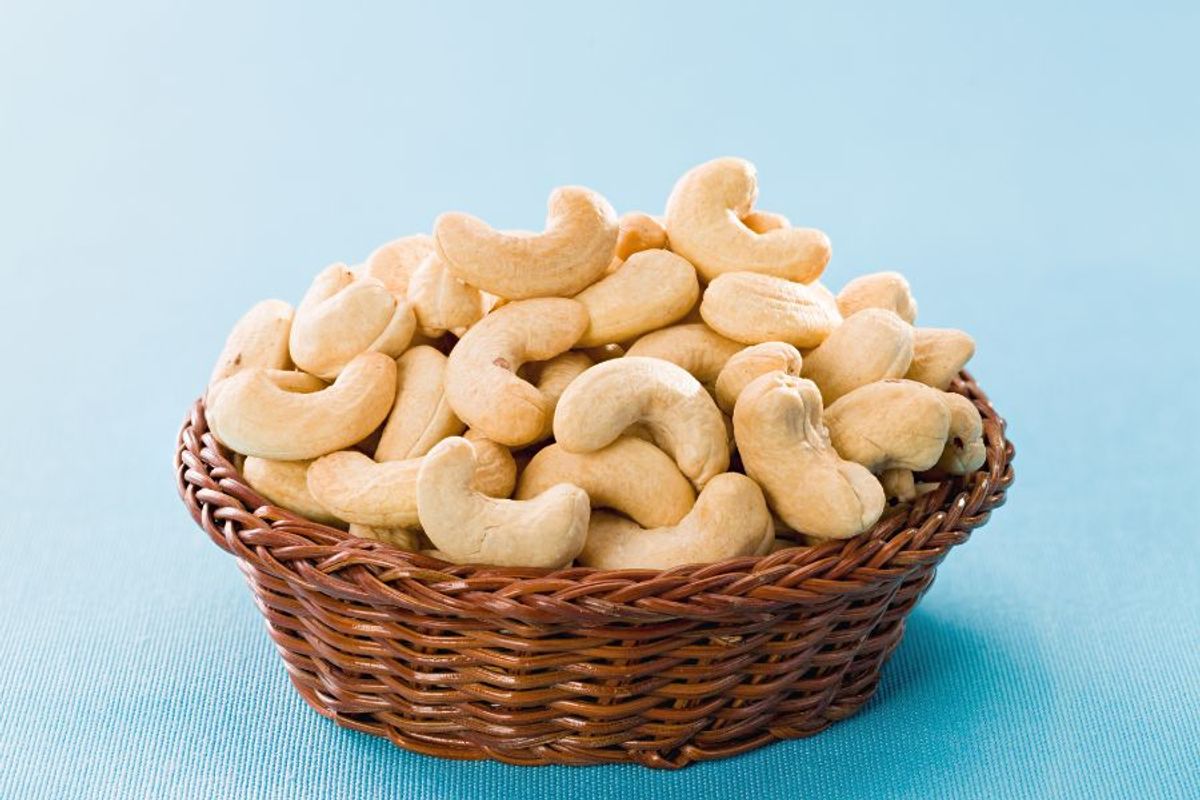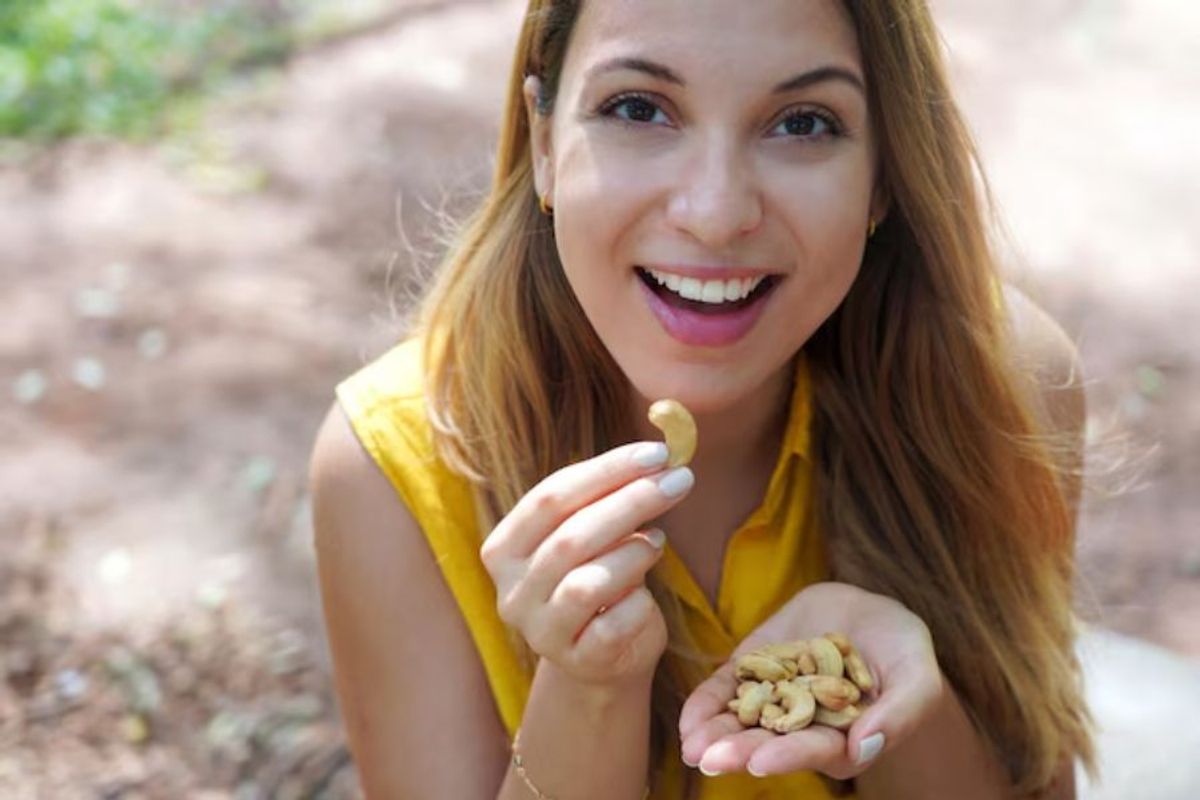Cashew Nuts: Surprising Benefits, Hidden Risks, and Why Everyone’s Eating Them

Mục lục
Cashew nuts are a favorite snack for many, often praised for their buttery taste and satisfying crunch. But here’s a fun fact that might surprise you: cashew nuts aren’t actually nuts at all. They’re seeds—specifically, the seeds of the tropical cashew tree.
Even more fascinating is the story of how these little kidney-shaped snacks became a global pantry staple. Behind their creamy texture and delicious flavor lies a rich nutritional profile, a few hidden dangers, and plenty of reasons why you might want to include (or exclude) them from your diet.
Let’s dive into what makes cashews so popular, their health benefits, nutritional value, possible downsides, and the best way to enjoy them.
What Exactly Are Cashew Nuts?
Despite their name, cashew nuts are seeds that grow from the bottom of the cashew apple—an unusual fruit that thrives in warm, tropical climates. The tree they come from, called Anacardium occidentale, is native to Brazil but now grows in parts of Africa, India, Southeast Asia, and other tropical regions.
Cashews, as we know them, go through quite the transformation before they reach our shelves. In their natural form, they’re enclosed in a hard shell that contains a toxic substance called urushiol—the same chemical found in poison ivy. That’s why raw cashews must be processed carefully and roasted before they are safe to eat.
So, if you’ve ever wondered why cashews are a bit more expensive than other nuts, now you know: their preparation process is delicate, labor-intensive, and essential to safety.

Are Cashew Nuts Toxic?
Let’s clear this up: the cashew itself isn’t toxic, but the shell that surrounds it is.
That shell contains urushiol, which can cause skin irritation, itching, blisters, and even rashes if touched. Thankfully, this risk is almost entirely eliminated through proper roasting and handling.
Cashews sold in stores—whether labeled "raw" or "roasted"—have been processed to remove the dangerous compounds. So, unless you’re plucking a cashew fresh from a tree (which we don’t recommend!), you have nothing to worry about.
Why Are Cashews So Popular?
It’s easy to see why cashews are one of the most loved “nuts” in the world.
First off, they’re incredibly versatile. You can toss them into a stir-fry, blend them into a creamy dairy-free sauce, bake them into granola, or simply enjoy a handful as a snack. They're mild in flavor but rich in texture, making them ideal for both sweet and savory recipes.
Cashews are especially popular among vegans and vegetarians because they’re a plant-based source of protein and healthy fats. Plus, when blended, they take on a creamy consistency—perfect for plant-based dips, dressings, and even cashew cheese.
You’ll also find cashews in traditional dishes from cuisines around the globe, especially in Thai, Indian, and African cooking, which has helped boost their popularity even more.
Are Cashews Good for You?
In short: yes!
Cashews pack a powerful nutritional punch in a small package. They are full of:
- Healthy unsaturated fats
- Plant-based protein
- Essential minerals like magnesium, zinc, copper, and iron
- Antioxidants
Here’s a closer look at why cashews can be a smart choice for your diet:
1. Cashews May Support Heart Health
Studies suggest that people who regularly include nuts in their diets—cashews included—may enjoy better heart health.
That’s because cashews are rich in unsaturated fats, which are known to support cardiovascular function by helping to lower bad cholesterol (LDL) and raise good cholesterol (HDL). They also contain fiber, another heart-friendly nutrient that supports healthy blood vessels and reduces inflammation.
So while cashews are technically high in fat, they offer the right kind of fat.

2. They Could Help Manage Cholesterol Levels
One of the reasons cashews are a heart-smart food is because of their effect on cholesterol. When enjoyed as part of a healthy, balanced diet, cashews may help reduce LDL cholesterol levels.
Unlike snacks high in saturated fat, cashews provide a cholesterol-friendly alternative that satisfies hunger without putting your health at risk.
3. Cashews May Help Control Blood Sugar
People with type 2 diabetes may also benefit from adding cashews to their diet. A study in 2018 found that participants who consumed cashews daily had lower blood sugar levels compared to those who didn’t.
This could be linked to cashews’ fiber content, healthy fats, and the way they affect digestion and absorption of carbohydrates.
4. They’re Packed with Antioxidants
Cashews contain powerful antioxidants, including vitamin E and other plant compounds, which help protect the body from harmful molecules known as free radicals.
By reducing oxidative stress, antioxidants in cashews may help lower inflammation and support overall immune health.
5. Cashews May Aid in Weight Management
This might sound strange since nuts are high in calories, but hear us out.
Research shows that people who regularly eat nuts tend to have lower body weights than those who don’t. In the case of cashews, it’s believed that not all of the fat is absorbed during digestion—some of it stays trapped in the fibrous walls of the seed.
Plus, cashews are filling. A small handful can help control appetite and reduce the temptation to overeat later in the day.
6. They’re Incredibly Easy to Add to Your Diet
Let’s not forget one of the most important points: cashews are convenient. Whether you enjoy them roasted, raw, blended, or as part of your favorite dish, they’re a simple way to add extra nutrients to your daily routine.
Just keep in mind that salted or flavored cashews can pack in extra sodium and calories—so if you're watching your intake, opt for the plain, unsalted varieties.
The Nutritional Value of Cashew Nuts
Don’t be fooled by their size—cashews are nutrient-dense.
Just a 40-gram serving of cashews can provide:
- Nearly 100% of your daily copper needs (which helps with brain function, immune support, and red blood cell formation)
- About one-third of your daily phosphorus, essential for healthy bones and teeth
- 29% of your manganese intake, a mineral important for energy production
- 28% of your daily magnesium, which plays a role in muscle and nerve function
That’s quite a nutritional boost from a small handful of nuts!
Cashews Are a Great Plant-Based Protein Source
For those following a plant-based diet, cashews are a fantastic protein option. With around 15.7 grams of protein per 100 grams, cashews offer almost the same amount of protein as an equivalent portion of cooked meat.
So whether you’re vegan, vegetarian, or just trying to cut down on animal products, cashews are a valuable and tasty way to get your protein fix.
Are There Any Downsides to Cashews?
As healthy as they are, cashews aren’t perfect.
One concern is their content of phytates—natural compounds found in many plant foods. Phytates can interfere with the absorption of certain nutrients like iron and zinc.
Luckily, this isn’t a major issue unless you eat a lot of phytate-rich foods without variety in your diet. Soaking or lightly roasting cashews before eating can reduce phytate levels and improve nutrient absorption.
Another consideration? Calories. Cashews are energy-dense, meaning they can add up quickly if you’re snacking mindlessly. Stick to modest portions, especially if you’re watching your weight.
Possible Side Effects of Eating Too Many Cashews
For most people, cashews are completely safe to eat. But like anything, too much of a good thing can be... too much.
Eating excessive amounts of cashews can cause:
- Bloating
- Constipation
- Weight gain
- Minor joint swelling (in rare cases)
And of course, if you have a tree nut allergy, cashews are completely off-limits.
So, Should You Be Eating Cashews?
In most cases, absolutely. Cashews are tasty, nutritious, and incredibly versatile. They offer several health benefits, can support a variety of diets, and are easy to incorporate into meals or eat as a snack.
Just remember:
- Buy pre-roasted or safe-to-eat versions
- Watch your portion sizes
- Go easy on the flavored and salted varieties
- Consider soaking if you want to boost nutrient absorption
Whether you sprinkle them on a salad, toss them in your stir-fry, or just grab a handful between meals, cashews are a satisfying snack you can feel good about.

Final Thoughts
Cashew nuts may be small, but their impact on your health and your diet is anything but. With the right approach, they can help support your heart, your brain, your blood sugar, and even your waistline.
So next time you’re reaching for a snack or adding ingredients to your dinner, don’t forget about the humble cashew. Behind its smooth shape and rich taste lies a nutritional powerhouse that deserves a place in your pantry.
Learn more: Cashew Kernel